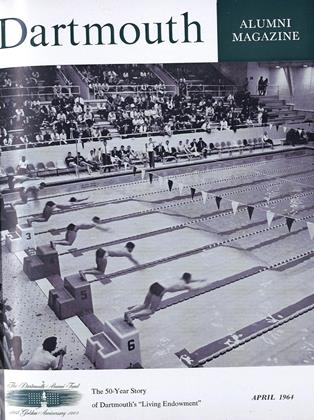By Stanwood Cobb '03. Washington, D.C.: Avalon Press, 1963. 84 pp.$2.50.
This small book summarizes the intellectual, spiritual, economic, and political content of what Mr. Cobb calls "Arabic-Islamic" civilization. Mr. Cobb did not intend to write a work that would be a weighty contribution to the world of scholarship; indeed he freely admits that much of the factual material in his book comes from George Saxton's An Introduction to theHistory of Science and Phillip K. Hitti's History of the Arabs. The originality of Mr. Cobb's work revolves around the fact that it is a subjective account of how his researches into "Arabic-Islamic" history have changed his outlook in general and his understanding of world history in particular. As Mr. Cobb states it, his purpose is "to create an atmosphere, to create a subjective approach to an objective subject."
An orientalist could quibble with Mr. Cobb over a certain lack of precision when some facets of Islam are treated or he might argue over certain over-simplifications in the interpretation of some specific trends and events in the history of the Arabs. But there would be little argument with the basic statements of Mr. Cobb, particularly his view that "Arabic-Islamic" culture was a vehicle which transmitted much of ancient culture to the modern world. To this reader the most interesting parts of the book were Mr. Cobb's impressions of what might be gained by a study of "Arabic-Islamic" culture.
Mr. Cobb has been an observer of Islam and of Muslims for many years. His first book, The Real Turk, which appeared just 50 years ago in 1914, was unusual in that it presented the Turks in a friendly light at a time when it was popular in the West to dismiss most Muslims as semi-barbarous peoples. Although it is common today (but still far from universal) to find Americans who hold sympathetic, non-condescending views of the various Afro-Asian civilizations, it is well to remember that it was thoughtful, open-minded men like Mr. Cobb who pioneered this attitude in our country.
Assistant Professor of History
 View Full Issue
View Full Issue
More From This Issue
-
 Feature
FeatureA BLUE-CHIP ASSET FOR 50 YEARS
April 1964 By HAROLD F. BRAMAN '21, CLIFFORD L. JORDAN JR. '45 -
 Feature
FeatureOldest Living Graduate, Will Be 100 This Month
April 1964 By Dr. Edwin H. Allen '85 -
 Feature
FeatureNew Computer Network Open to Entire College
April 1964 -
 Feature
FeatureShould Congress Be Reorganized?
April 1964 -
 Class Notes
Class Notes1926
April 1964 By KENNETH W. WEEKS, HERMAN J. TREFETHEN -
 Class Notes
Class Notes1924
April 1964 By CHAUNCEY N. ALLEN, PHILLIPS M. VAN HUYCK
ROBERT G. LANDEN
Books
-
 Books
BooksTHE FIVE HUNDRED HATS OF BARTHOLOMEW CUBBINS
January 1939 By Alexander Laing '25 -
 Books
BooksTHE LIFE OF ARTHUR YOUNG, 1741-1821
November 1973 By DAVID ROBERTS -
 Books
BooksNINETEEN DARTMOUTH POEMS.
MAY 1968 By JOHN HURD '21 -
 Books
BooksALP.
MAY 1970 By JOHN J. KANE -
 Books
BooksYOU NEED A COMPLETE REST
October 1953 By RADFORD C. TANZER '25 -
 Books
BooksTHE LIFE OF ALCIBIADES
FEBRUARY 1930 By Royal C. Nemiah



